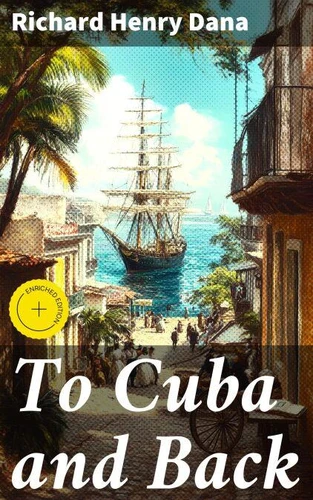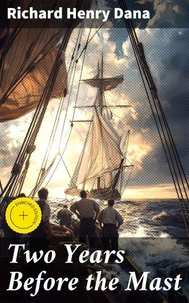To Cuba and Back. Enriched edition. An American's Journey to Discover Cuba's 19th Century Society and Culture
Par : ,Formats :
Disponible dans votre compte client Decitre ou Furet du Nord dès validation de votre commande. Le format ePub est :
- Compatible avec une lecture sur My Vivlio (smartphone, tablette, ordinateur)
- Compatible avec une lecture sur liseuses Vivlio
- Pour les liseuses autres que Vivlio, vous devez utiliser le logiciel Adobe Digital Edition. Non compatible avec la lecture sur les liseuses Kindle, Remarkable et Sony
 , qui est-ce ?
, qui est-ce ?Notre partenaire de plateforme de lecture numérique où vous retrouverez l'ensemble de vos ebooks gratuitement
Pour en savoir plus sur nos ebooks, consultez notre aide en ligne ici
- Nombre de pages192
- FormatePub
- ISBN4057664580337
- EAN4057664580337
- Date de parution03/12/2019
- Protection num.Digital Watermarking
- Taille1 Mo
- Infos supplémentairesepub
- ÉditeurGOOD PRESS
Résumé
In "To Cuba and Back, " Richard Henry Dana presents an evocative travel narrative that invites readers into the vibrant and tumultuous world of 19th-century Cuba. Written in a richly descriptive style, Dana's account weaves together personal experience with keen observations, capturing the island's natural beauty, cultural richness, and complex socio-political landscape. Contextually situated in a period when American interest in Cuba was burgeoning, Dana's prose reflects a blend of romanticism and realism, providing a nuanced portrayal of an era shaped by colonial influence and burgeoning nationalism.
This work serves as a critical lens through which we can examine the intersections of travel, imperialism, and identity during a formative time in American literature. Richard Henry Dana, an influential American writer, lawyer, and social reformer, drew upon his maritime experience and deep commitment to social justice in crafting this narrative. His earlier work, "Two Years Before the Mast, " had already established him as a prominent figure in American literature.
Dana's voyage to Cuba was not just an adventure, but a culmination of his intellectual pursuits, illustrating his fascination with the cultural and human dimensions of the lands he visited, while remaining sensitive to the moral imperatives of his time. Readers seeking a vibrant exploration of Cuba through the eyes of a keen observer will find "To Cuba and Back" irresistible. Dana's masterful storytelling appeals not only to those with an interest in travel literature but also to anyone intrigued by the complexities of cultural encounters.
This book is a significant contribution to the canon of American literature and offers timeless insights into the interplay of travel, identity, and social consciousness. In this enriched edition, we have carefully created added value for your reading experience: - A succinct Introduction situates the work's timeless appeal and themes. - The Synopsis outlines the central plot, highlighting key developments without spoiling critical twists. - A detailed Historical Context immerses you in the era's events and influences that shaped the writing. - A thorough Analysis dissects symbols, motifs, and character arcs to unearth underlying meanings. - Reflection questions prompt you to engage personally with the work's messages, connecting them to modern life. - Hand-picked Memorable Quotes shine a spotlight on moments of literary brilliance. - Interactive footnotes clarify unusual references, historical allusions, and archaic phrases for an effortless, more informed read.
This work serves as a critical lens through which we can examine the intersections of travel, imperialism, and identity during a formative time in American literature. Richard Henry Dana, an influential American writer, lawyer, and social reformer, drew upon his maritime experience and deep commitment to social justice in crafting this narrative. His earlier work, "Two Years Before the Mast, " had already established him as a prominent figure in American literature.
Dana's voyage to Cuba was not just an adventure, but a culmination of his intellectual pursuits, illustrating his fascination with the cultural and human dimensions of the lands he visited, while remaining sensitive to the moral imperatives of his time. Readers seeking a vibrant exploration of Cuba through the eyes of a keen observer will find "To Cuba and Back" irresistible. Dana's masterful storytelling appeals not only to those with an interest in travel literature but also to anyone intrigued by the complexities of cultural encounters.
This book is a significant contribution to the canon of American literature and offers timeless insights into the interplay of travel, identity, and social consciousness. In this enriched edition, we have carefully created added value for your reading experience: - A succinct Introduction situates the work's timeless appeal and themes. - The Synopsis outlines the central plot, highlighting key developments without spoiling critical twists. - A detailed Historical Context immerses you in the era's events and influences that shaped the writing. - A thorough Analysis dissects symbols, motifs, and character arcs to unearth underlying meanings. - Reflection questions prompt you to engage personally with the work's messages, connecting them to modern life. - Hand-picked Memorable Quotes shine a spotlight on moments of literary brilliance. - Interactive footnotes clarify unusual references, historical allusions, and archaic phrases for an effortless, more informed read.
In "To Cuba and Back, " Richard Henry Dana presents an evocative travel narrative that invites readers into the vibrant and tumultuous world of 19th-century Cuba. Written in a richly descriptive style, Dana's account weaves together personal experience with keen observations, capturing the island's natural beauty, cultural richness, and complex socio-political landscape. Contextually situated in a period when American interest in Cuba was burgeoning, Dana's prose reflects a blend of romanticism and realism, providing a nuanced portrayal of an era shaped by colonial influence and burgeoning nationalism.
This work serves as a critical lens through which we can examine the intersections of travel, imperialism, and identity during a formative time in American literature. Richard Henry Dana, an influential American writer, lawyer, and social reformer, drew upon his maritime experience and deep commitment to social justice in crafting this narrative. His earlier work, "Two Years Before the Mast, " had already established him as a prominent figure in American literature.
Dana's voyage to Cuba was not just an adventure, but a culmination of his intellectual pursuits, illustrating his fascination with the cultural and human dimensions of the lands he visited, while remaining sensitive to the moral imperatives of his time. Readers seeking a vibrant exploration of Cuba through the eyes of a keen observer will find "To Cuba and Back" irresistible. Dana's masterful storytelling appeals not only to those with an interest in travel literature but also to anyone intrigued by the complexities of cultural encounters.
This book is a significant contribution to the canon of American literature and offers timeless insights into the interplay of travel, identity, and social consciousness. In this enriched edition, we have carefully created added value for your reading experience: - A succinct Introduction situates the work's timeless appeal and themes. - The Synopsis outlines the central plot, highlighting key developments without spoiling critical twists. - A detailed Historical Context immerses you in the era's events and influences that shaped the writing. - A thorough Analysis dissects symbols, motifs, and character arcs to unearth underlying meanings. - Reflection questions prompt you to engage personally with the work's messages, connecting them to modern life. - Hand-picked Memorable Quotes shine a spotlight on moments of literary brilliance. - Interactive footnotes clarify unusual references, historical allusions, and archaic phrases for an effortless, more informed read.
This work serves as a critical lens through which we can examine the intersections of travel, imperialism, and identity during a formative time in American literature. Richard Henry Dana, an influential American writer, lawyer, and social reformer, drew upon his maritime experience and deep commitment to social justice in crafting this narrative. His earlier work, "Two Years Before the Mast, " had already established him as a prominent figure in American literature.
Dana's voyage to Cuba was not just an adventure, but a culmination of his intellectual pursuits, illustrating his fascination with the cultural and human dimensions of the lands he visited, while remaining sensitive to the moral imperatives of his time. Readers seeking a vibrant exploration of Cuba through the eyes of a keen observer will find "To Cuba and Back" irresistible. Dana's masterful storytelling appeals not only to those with an interest in travel literature but also to anyone intrigued by the complexities of cultural encounters.
This book is a significant contribution to the canon of American literature and offers timeless insights into the interplay of travel, identity, and social consciousness. In this enriched edition, we have carefully created added value for your reading experience: - A succinct Introduction situates the work's timeless appeal and themes. - The Synopsis outlines the central plot, highlighting key developments without spoiling critical twists. - A detailed Historical Context immerses you in the era's events and influences that shaped the writing. - A thorough Analysis dissects symbols, motifs, and character arcs to unearth underlying meanings. - Reflection questions prompt you to engage personally with the work's messages, connecting them to modern life. - Hand-picked Memorable Quotes shine a spotlight on moments of literary brilliance. - Interactive footnotes clarify unusual references, historical allusions, and archaic phrases for an effortless, more informed read.





